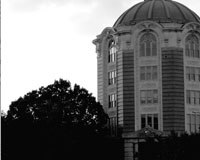
Bilirubin: an Invective Against Wellness
Propostion 3: In Suffolk
Father's Day of Glass
Bilirubin: an Invective Against Wellness
Why concoct a metaphor with whatever is meant by “heart”? Hasn’t the organ already carried enough of our nonsense to blown-out capillaries? The taut, translucent skin flakes and cracks, desiccated by what falls under this banner. Sadness doles its labor out in pangs, hammers, mowers, the compulsory listening of an afternoon. Bitter swells; sweet clover is misnamed; turmeric tastes like the ground root that it is. The heart’s many disorders (angina, hypertension, valve dissection) do not get at what we mean, you and I, she and that boy with whom she walks at gloaming in the park. I am done holding hands; it does nothing to prepare us for what’s to come and at the first sign of real trouble those fingers unclasp. I will take my lesioned face down to the heartfelt creek, that vena cava of congealed rot, and watch the breeze riffle my reflection. Its hundreds of miles stretch out like an unspooled liver dissected after decades of abuse. We are isolated symptoms, margins performing obsolescence, right-aligned words that only hint at the blank ago. We train the eyes for what they cannot keep.
Dear Mother
In Suffolk I get even more confused. My shoes, which have never before had laces, need tying. The letters I try to send un-gum their stamps. I am in an airport without planes: that is what I keep telling myself: You are just in an airport without planes. Walking is possible. Flight is possible. Tying the laces doesn’t worry me. I learned long ago to even them, then knot the even loops.
Knotting the Even Loops
First there was a problem, one longer than the other (Let AB and C be the two given unequal straight lines). Unequal laces leave you tripping and stopping, the dog on its leash trying to pull you from your shoes. The dog you imagine yourself walking here in Suffolk pulls quite hard. (Let AB be the greater of them.) This is shoe-tying but also how you were made. It is both you and I tying the shoe behind the panting dog. In Suffolk there are no cats or birds. There is only the history of mathematics. How you were made: it is required to cut off from AB the greater a straight line equal to C the less. (Place AD at the point A equal to the straight line C and describe the circle DEF with center A and radius AD.) You do not need to tie the other shoe. The dog and you happily run back to the antebellum home of the kind woman. You research the proposition on how you were made. You were right. It is the same as the evening of the laces. The helixes left by jets in the clear blue sky are just like laces, the evening of laces dimming on the pages. In Suffolk the tongues of dogs wag. The dog and you are happy to run back to the home of the kind woman in her dotage. The tongues of the citizens gladly report what there is and isn’t. You slip easily from your shoes. The letter you pen begins,
“Dear Mother,
In Suffolk I get even more confused…”
Birds
He organized his little glass birds because birds at some point come to fall. It isn’t clear whether he had any control over when. We couldn’t find out about the shapes of father’s birds, if they were replicas of a particular species, if they shared congruence or simply similarity. The river had been roaming as glass since I could remember. Father’s spectacles had always been dark glass, the glass of self-generation, the mind dreaming wings for sight, the bird perched upon the nose. The bridge over the river begged for something to house its macadam. Father comforted the bridge over the river, insisting that his birds would fall, explaining gravity. “There is similarity in the way different objects fall,” he said. The macadam glassed over with the blight of birds. Father’s eyes glassed over, but not with tears. None feel in two dimensions. In two dimensions the river had always been the bridge, the bridge glass. It is nothing we can get at with our tenses.
Elements Book VI
“An interesting note,” Father says. The glass over his body has improved his already-meticulous enunciation. He doesn’t want to break. “Euclid did not define congruence or similarity until Book VI. Therefore, it is impossible to know if earlier uses of those terms are congruent or even similar to our current senses.” I do not nod. Movement is much more difficult, as is mastication, as is the language of the body when one is housed in glass.
Cal Freeman’s work has appeared in many journals including Commonweal, The Journal, Drunken Boat, The Cortland Review, Birmingham Poetry and The Paris-American. He is the recipient of the Howard P. Walsh Award for Literature, The Ariel Poetry Prize, and The Devine Poetry Fellowship (judged by Terrance Hayes). He has also been nominated for Pushcart Prizes in poetry and creative nonfiction. He currently teaches at Oakland University and serves as managing editor of Marick Press.

